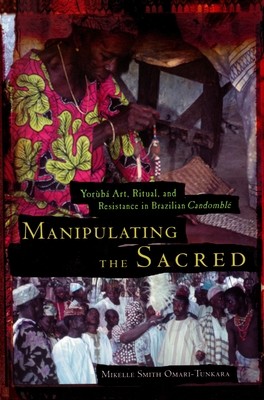
- We will send in 10–14 business days.
- Author: Mikelle S Omari-Tunkara
- Publisher: Wayne State University Press
- ISBN-10: 0814328520
- ISBN-13: 9780814328521
- Format: 15 x 22.6 x 1.3 cm, softcover
- Language: English
- SAVE -10% with code: EXTRA
Reviews
Description
At a time when the art of the African diaspora has aroused much general interest for its multicultural dimensions, Mikelle Smith Omari-Tunkara contributes strikingly rich insights as a participant/observer in the African-based religions of Brazil. She focuses on the symbolism and function of ritual objects and costumes used in the Brazilian Candomblé (miniature African environments or temples) of the Bahia region, which combine Yorùbá, Bantu/Angola, Caboclo, Roman Catholic, and/or Kardecist/Spiritist elements. An initiate herself with more than twenty years of study, the author is considered an insider, and has witnessed how practitioners manipulate the sacred to encode, in art and ritual, vital knowledge about meaning, values, epistemologies, and history. She demonstrates how this manipulation provides Brazilian descendents of slaves with a sense of agency-with a link to their African heritage and a locus for resistance to the dominant Euro-Brazilian culture.
EXTRA 10 % discount with code: EXTRA
The promotion ends in 19d.03:29:19
The discount code is valid when purchasing from 10 €. Discounts do not stack.
- Author: Mikelle S Omari-Tunkara
- Publisher: Wayne State University Press
- ISBN-10: 0814328520
- ISBN-13: 9780814328521
- Format: 15 x 22.6 x 1.3 cm, softcover
- Language: English English
At a time when the art of the African diaspora has aroused much general interest for its multicultural dimensions, Mikelle Smith Omari-Tunkara contributes strikingly rich insights as a participant/observer in the African-based religions of Brazil. She focuses on the symbolism and function of ritual objects and costumes used in the Brazilian Candomblé (miniature African environments or temples) of the Bahia region, which combine Yorùbá, Bantu/Angola, Caboclo, Roman Catholic, and/or Kardecist/Spiritist elements. An initiate herself with more than twenty years of study, the author is considered an insider, and has witnessed how practitioners manipulate the sacred to encode, in art and ritual, vital knowledge about meaning, values, epistemologies, and history. She demonstrates how this manipulation provides Brazilian descendents of slaves with a sense of agency-with a link to their African heritage and a locus for resistance to the dominant Euro-Brazilian culture.


Reviews